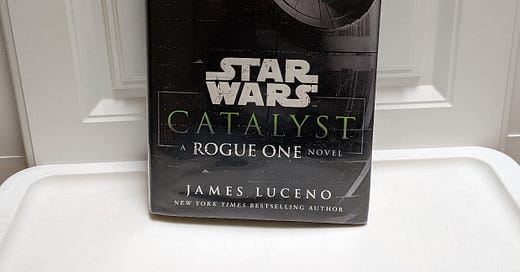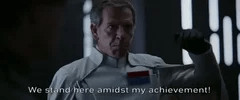My rating: 3.5/5
Pub Date: Nov. 15. 2016
Legends/Canon: Canon
Timeline: 21 BBY - 17 BBY

Welcome back to the Star Wars Book Club! Today we’re discussing Catalyst by James Luceno, and we’re doing so without spoilers, so hang on tight and here we go!
Right off the bat, I didn’t enjoy Catalyst as much as Rogue One. It backs us up in time a bit to when Jyn was born, and focuses on her parents, Galen and Lyra, along with our old Imperial pal, Orson Krennic.
Speaking of the devil, Krennic was very annoying in this book as well, which is good character writing on the part of James Luceno, but gets frustrating to read about after a while. Everything in his life is like one big chess game. He’s only there to win and out strategize everyone, especially Tarkin. All in effort to achieve ultimate power. The way he deals with Galen and Lyra is so manipulative, but the worst part is that he’s so good at what he does. If using people is a special skill, Krennic has it in spades.
Other special skills in Catalyst most notably include Galen’s superior science research ability, specifically in the field of energy. This man is as much of an expert on Kyber crystals as the Jedi, and what he lacks in Force wielding ability, he makes up for in super smarts. And yes, these are the kind of super smarts that make him quite bad at social interactions and incapable of speaking in layman's terms. This quote describes Galen quite well:
“Frequently there were no words for what was in Galen’s mind, which made his formulas and equations intelligible only to a rare few. It wasn’t that he didn’t wish to see the world as others did; he was unable to. He saw more deeply into things, and was attuned to nature’s own musings and inner dialogues.” ~James Luceno
Kudos to Luceno for being a self-aware author and throwing that paragraph in there. It helps lessen the sting of the stereotypical really smart person being socially inept. It also helps to explain how Galen is so easily manipulated. His mind gets so singularly focused on one aspect of his research that he doesn’t even see what’s happening in the world around him, to the detriment of his family. That little family was probably my favorite part of the book.
In fact, I wish that was a more central part of the book. As it stands, Catalyst is one drawn out plot to create the Death Star. Throughout the whole of it, Krennic is trying to get the Death Star project off the ground, no matter who he has to manipulate to do it, and Galen is just working on Kyber crystal projects to create renewable energy. (As if, Galen. As if.) But Lyra, Galen’s wife, she’s interesting. I love her career background as a surveyor/research analyst. She gets to travel across the galaxy and see and study all sorts of fun stuff. I would have loved to see more of that included in the story, and a little less of the technical Death Star stuff.
That’s because this book felt very technical at times, and for me that’s less interesting than reading about family dynamics. I think the details about the Death Star that we got in Rogue One are sufficient. While it was cool to see the Death Star being built in Catalyst, I didn’t particularly need as many technical and construction and science related details.
As a slight aside, I also didn’t need the huge vocab words. I didn’t start keeping a list until over halfway through, but every once in a while there was a word that I had to stop and sound out and it tore me right out of the book. Some of those words were: phantasmagoria, somnolent, accretion, vouchsafe, and somnambulant. I like some solid vocab words, but I felt distinctly pulled out of the book when I read these specific ones.
There were also some sentences like this:
“Contemplating the amalgam of stone and exotic woods, Galen felt as if he were confronting an exteriorization of his consciousness, and the scattered concerns that were bedeviling him.”
Is it just me, or does that sentence feel like something out of a college English assignment? Don’t get me wrong, I appreciate some high-level writing, but after about 300 pages of somewhat technical writing my mind is tired of that. Where’s the explosions? Where’s the lightsabers? Where’s the classic Star Wars action scenes?
I know I’m sounding kind of harsh, but I’m only 9 books into this 200+ book challenge and already it’s getting hard to rank the books against each other. Being a little nit-picky is now the name of the game for me.
And that leaves me with only one last thing to do: give my recommendation. I would say that this book is not for the casual fan. Rogue One, in my opinion, gives enough Death Star detail to satisfy, along with delivering the action that Catalyst was missing. If you want to read every Star Wars book, like me, or if you’re inclined to read about the more technical aspect of Star Wars, then this book is great. If not, then this book is skippable, in my most humble opinion.
Thanks for being here for this edition of the Star Wars Book Club! Up next is Rebel Rising by Beth Revis, so make sure to check back here on September 30 for that.
Have you read Catalyst? What did you think?







I appreciate your honesty.